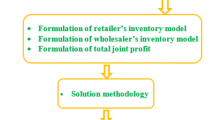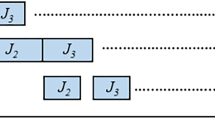Abstract
The Joint Replenishment Problem (\({\hbox {JRP}}\)) is a fundamental optimization problem in supply-chain management, concerned with optimizing the flow of goods from a supplier to retailers. Over time, in response to demands at the retailers, the supplier ships orders, via a warehouse, to the retailers. The objective is to schedule these orders to minimize the sum of ordering costs and retailers’ waiting costs. We study the approximability of \({\hbox {JRP-D}}\), the version of \({\hbox {JRP}}\) with deadlines, where instead of waiting costs the retailers impose strict deadlines. We study the integrality gap of the standard linear-program (LP) relaxation, giving a lower bound of \(1.207\), a stronger, computer-assisted lower bound of \(1.245\), as well as an upper bound and approximation ratio of \(1.574\). The best previous upper bound and approximation ratio was \(1.667\); no lower bound was previously published. For the special case when all demand periods are of equal length, we give an upper bound of \(1.5\), a lower bound of \(1.2\), and show APX-hardness.










Similar content being viewed by others
Notes
Note: our use of the term “period” is different from its use in operations research literature on supply-chain management problems.
That is, for any \(i\in \mathbb {N}\), the event \(I= i\) is determined by the first \(i\) samples.
References
Alimonti, P., & Kann, V. (2000). Some APX-completeness results for cubic graphs. Theoretical Computer Science, 237(1–2), 123–134.
Arkin, E., Joneja, D., & Roundy, R. (1989). Computational complexity of uncapacitated multi-echelon production planning problems. Operations Research Letters, 8(2), 61–66.
Becchetti, L., Marchetti-Spaccamela, A., Vitaletti, A., Korteweg, P., Skutella, M., & Stougie, L. (2009). Latency-constrained aggregation in sensor networks. ACM Transactions on Algorithms, 6(1), 13:1–13:20.
Bienkowski, M., Byrka, J., Chrobak, M., Jeż, Ł., & Sgall, J. (2014). Better approximation bounds for the joint replenishment problem. In: Proceedings of the of the 25th ACM-SIAM Symposium on Discrete Algorithms (SODA), pp. 42–54.
Brito, C., Koutsoupias, E., & Vaya, S. (2012). Competitive analysis of organization networks or multicast acknowledgement: How much to wait? Algorithmica, 64(4), 584–605.
Buchbinder, N., Kimbrel, T., Levi, R., Makarychev, K., & Sviridenko, M. (2008). Online make-to-order joint replenishment model: Primal dual competitive algorithms. In: Proceedings of the 19th ACM-SIAM Symposium on Discrete Algorithms (SODA), pp. 952–961.
Khanna, S., Naor, J., & Raz, D. (2002). Control message aggregation in group communication protocols. In: Proceedings of the 29th International Colloquium on Automata, Languages and Programming (ICALP), pp. 135–146.
Levi, R., Roundy, R., & Shmoys, D.B. (2005). A constant approximation algorithm for the one-warehouse multi-retailer problem. In: Proceedings of the Sixteenth Annual ACM-SIAM symposium on Discrete Algorithms (SODA), pp. 365–374.
Levi, R., Roundy, R., & Shmoys, D. B. (2006). Primal-dual algorithms for deterministic inventory problems. Mathematics of Operations Research, 31(2), 267–284.
Levi, R., Roundy, R., Shmoys, D. B., & Sviridenko, M. (2008). A constant approximation algorithm for the one-warehouse multiretailer problem. Management Science, 54(4), 763–776.
Levi, R., & Sviridenko, M. (2006). Improved approximation algorithm for the one-warehouse multi-retailer problem. In: Proceedings of the 9th International Workshop on Approximation Algorithms for Combinatorial Optimization (APPROX), pp. 188–199.
Nonner, T., & Souza, A. (2009). Approximating the joint replenishment problem with deadlines. Discrete Mathematics, Algorithms and Applications, 1(2), 153–174.
Acknowledgments
We would like to thank Łukasz Jeż, Dorian Nogneng, Jiří Sgall, and Grzegorz Stachowiak for stimulating discussions and useful comments. We are also grateful to anonymous reviewers of earlier versions of this manuscript for pointing out several mistakes and suggestions for improving the presentation. A preliminary version of this work appeared in the Proceedings of the 40th International Colloquium on Automata, Languages and Programming (ICALP’13). Research supported by NSF Grants CCF-1217314, CCF-1117954, OISE-1157129; EPSRC grants EP/J021814/1 and EP/D063191/1; FP7 Marie Curie Career Integration Grant; Royal Society Wolfson Research Merit Award; and Polish National Science Centre Grant DEC-2013/09/B/ST6/01538.
Author information
Authors and Affiliations
Corresponding author
Appendix: Wald’s lemma
Appendix: Wald’s lemma
Here is the variant of Wald’s Lemma (also known as Wald’s identity, and a consequence of standard “optional stopping” theorems) that we use in Sect. 2. The proof is standard; we present it for completeness.
Lemma 10
(Wald’s Lemma) Consider a random experiment that, starting from a fixed start state \(S_0\), produces a random sequence of states \(S_1,S_2,S_3,\ldots \) Let random index \(T\in \{0,1,2,\ldots \}\) be a stopping time for the sequence (that is, for each positive integer \(t\), the event “\(T \le t\)” is determined by state \(S_t\)). Let function \(\phi :\{S_t\} \rightarrow {\mathbb R}\) map the states to \({\mathbb R}\). Suppose that, for some fixed constants \(\xi \) and \(F\),
-
(i)
\((\forall t<T)~ \mathbf{{E}}[\phi (S_{t+1})~|~ S_t] \ge \phi (S_t)+\xi \),
-
(ii)
either \((\forall t<T)~ \phi (S_{t+1})-\phi (S_t) \ge F\) in all outcomes, or \((\forall t<T)~ \phi (S_{t+1})-\phi (S_t) \le F\) in all outcomes, and
-
(iii)
\(T\) has finite expectation.
Then, \(\mathbf{{E}}[\phi (S_T)]\, \ge \,\phi (S_0) + \xi \, \mathbf{{E}}[T]\).
Proof
For each \(t\ge 0\), define random variable \(\delta _t = \phi (S_{t+1})-\phi (S_{t})\). By assumption (i), \(\mathbf{{E}}[\delta _{t}~|~S_t] \ge \xi \) for \(t<T\). Since the event “\(T > t\)” is determined by \(S_t\), this implies that \(\mathbf{{E}}[\delta _{t}~|~T>t] \ge \xi \). Then the inequality in the lemma can be derived as follows:
Exchanging the order of summation in the third step above does not change the value of the sum, because (by assumptions (ii) and (iii)) either the sum of all negative terms is at least \(\sum _{\tau \ge 0} \sum _{t<\tau } \Pr [T=\tau ] F ~=~ F \sum _{\tau \ge 0} \tau \Pr [T=\tau ] ~=~ F\,\mathbf{{E}}[T]\), which is finite, or (likewise) the sum of all positive terms is finite.
Each application in Sect. 2 has \(\xi \ge \mathcal{Z}(p)> 0\) and \(\phi (S_T) - \phi (S_0) \le U\) for some fixed \(U\). In this case Wald’s Lemma implies \(\mathbf{{E}}[T] \le U/\xi \le U/\mathcal{Z}(p)\).
Rights and permissions
About this article
Cite this article
Bienkowski, M., Byrka, J., Chrobak, M. et al. Approximation algorithms for the joint replenishment problem with deadlines. J Sched 18, 545–560 (2015). https://doi.org/10.1007/s10951-014-0392-y
Received:
Accepted:
Published:
Issue Date:
DOI: https://doi.org/10.1007/s10951-014-0392-y




